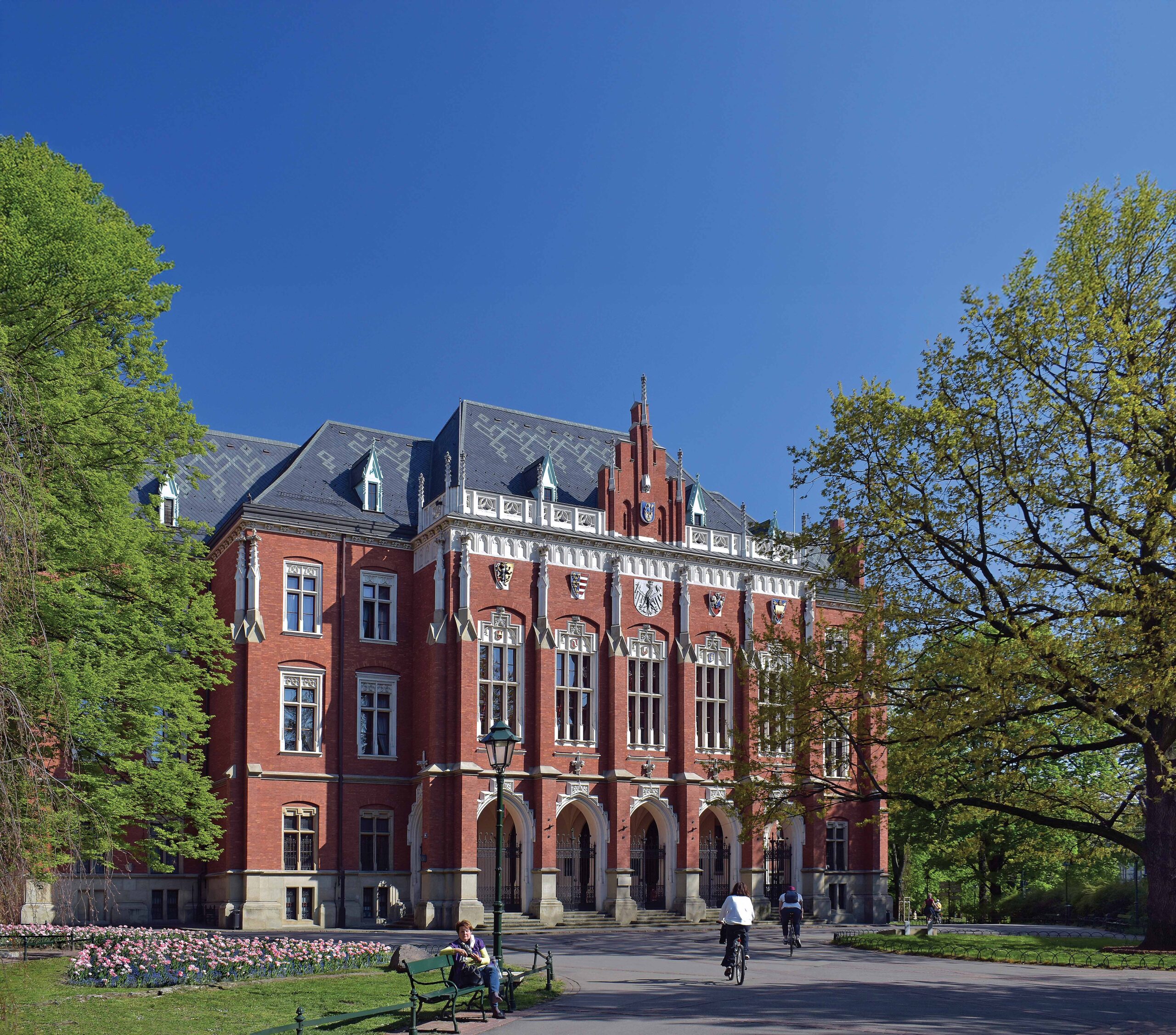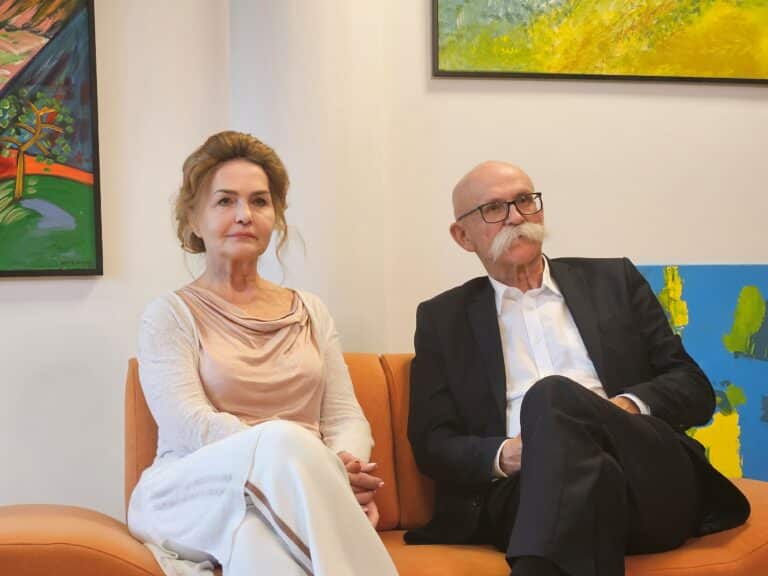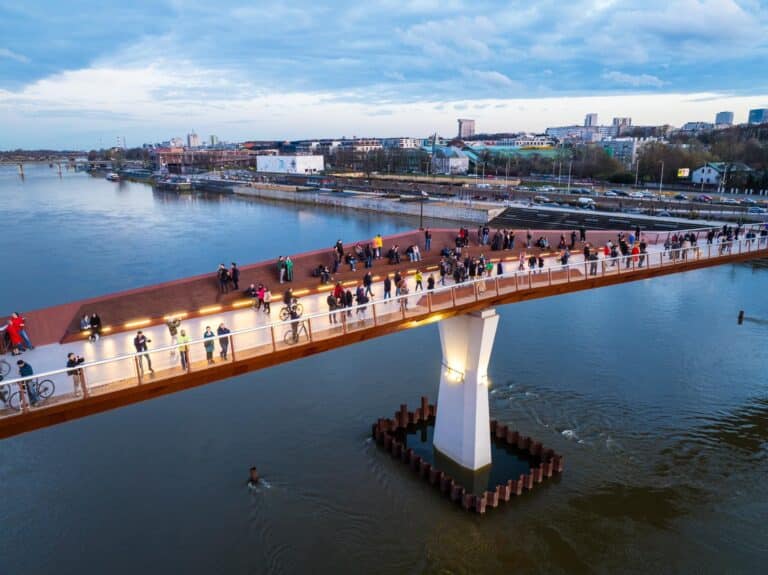Study in Poland
Come to Poland and see for yourself. Almost every university holds open days where you can explore specific academic programs, talk with professors and students, and get a feel for life on campus.
Studying in Poland? Absolutely yes! Higher education in Poland means high academic standards, and degrees from Polish universities are recognized across the European Union—and beyond. Polish universities offer increasingly advanced research facilities: scientific laboratories, participation in international research projects, student exchange programs with institutions worldwide—and on top of that, tuition costs are still lower than in the US or Western Europe. And that’s just the beginning!
A Few Facts
Poland has 18 universities, 70 economics schools, 25 technical universities, 19 art academies, 9 medical schools, 7 agricultural institutions, 2 maritime academies, and many more offering diverse programs. Altogether, there are over 400 public and private higher education institutions in Poland. That means you can study practically any subject you choose.
As mentioned, back in 2010, there were around 21,000 international students in Poland (about 1% of all students). That’s changed dramatically. Since 2020, the number of foreign students in Poland has grown five times over. In 2022, the figure reached 89,000–105,000 (7–9% of the student population).
According to the Central Statistical Office (GUS – the main governmental statistics agency in Poland), in the 2023/24 academic year, 107,130 students from 177 countries were enrolled at Polish universities, making up 8.6% of all students. Among them, 53,111 (49.6%) were enrolled at public institutions and 53,983 (50.4%) at private ones—a 1.6% increase from the 2022/23 academic year. This upward trend continues steadily and mirrors the trend in other EU countries.
Due to Poland’s geographical location and linguistic similarities, many international students in Poland come from Ukraine and Belarus. Ukrainian and Belarusian students generally find it easier to learn Polish and often choose to study in Poland with the intent of staying. They usually study law, business, administration, social sciences, or journalism.
There are also many students from Asia and Africa, who typically choose technical or medical majors (Japanese students, for example, appreciate the Fryderyk Chopin University of Music in Warsaw). In the 2021/2022 academic year, 2,854 students came from Turkey, 2,449 from India, and 2,245 from Zimbabwe. Fewer students come from Western countries.
When it comes to exchange programs like Erasmus, most students come from Spain, Turkey, Italy, and France. Each year, more and more international students choose technical, IT, and medical majors in Poland.
In 2021/2022, 5,958 international students studied engineering, manufacturing, and construction, while 5,248 studied computer and communication technologies (ICT)—roughly 6–7% of the total.
Why Is It Worth Studying in Poland?

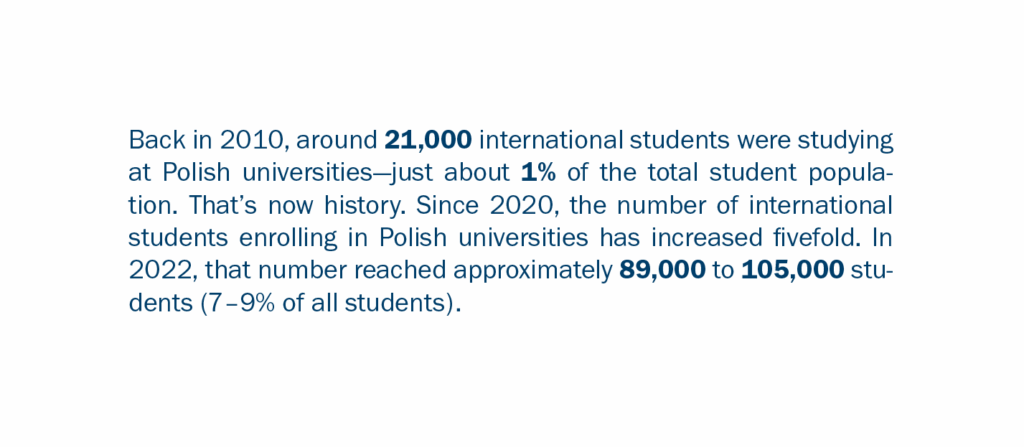
Academic Quality
Polish universities are highly regarded for their growing academic excellence, particularly in fields like medicine, engineering, IT, and business. Degrees obtained in Poland are recognized across the EU and beyond. Many Polish universities participate in global research projects, and new programs are launched regularly to keep up with the changing world. Some foreign universities are even opening branches in Poland.
While studying in Poland, you could join a team designing parts for a Mars rover—or the rover itself—conduct research on new medical technologies, or work on innovations in construction and industry. Sławosz Uznański-Wiśniewski, the Polish astronaut who recently joined the 635th orbital flight and spent time aboard the International Space Station, graduated from Łódź University of Technology and also studied in France.
Last year, students from AGH University of Science and Technology in Kraków won the international University Rover Challenge in the US.
Besides tech programs, you can study linguistics or languages that are rarely taught in Western Europe but may be valuable for careers in fast-growing Central and Eastern European markets.
If you’re passionate about music, graduating from one of Poland’s renowned music academies may land you a spot in some of the best symphony orchestras around the world.
Modern Campuses and Innovation
Many Polish universities have invested in state-of-the-art facilities, libraries, labs, and student services. Poland contributes significantly to graphene research and its use in electronics, medicine, and energy. Polish scientists discovered one of the key methods of obtaining graphene. While studying in Poland, you can join projects like these.
There’s also antimatter research happening in Poland, especially as part of the J-PET experiment at Jagiellonian University, in collaboration with CERN. Studying astronomy, you might join astrophysical research; in construction, you’ll explore future-oriented building tech; in chemical and process engineering, you’ll learn how to design entire production lines using AI.
In short, Polish universities offer something for everyone.
Student Exchange Programs
When you study in Poland, you can participate in exchange programs with universities all over the world—from fellow EU countries to the USA, Canada, and even China, Korea, or Japan. How about visiting Chile’s Atacama Desert to work at an astronomical observatory? Or joining an international penguin-counting project in Antarctica?
Polish universities collaborate with leading global research centers, and all of this is within reach when you study in Poland.
Cost of Education and Living
Compared to Western Europe or North America, studying and living in Poland is much more affordable. Tuition is competitive, and living expenses—including housing, transportation, and food—are student-friendly.
Studying medicine in the US or Canada often means massive expenses and long-term debt. Medical school there costs $40,000 to $150,000 per year. In Poland, you can study medicine in English for a similar number—but in złoty, not dollars. Much cheaper!
Architecture degrees in the US cost around $70,000 per year. In Poland, it’s about 70,000 PLN per year—nearly four times less—and Polish architects are internationally recognized for their stunning designs.
You’ll pay less, but earn a degree that grants you the same rights and qualifications as one from an American or Canadian school. Graduating in Poland also allows you to work or specialize practically anywhere in the EU.
Don’t worry about housing either. Student cities in Poland offer rental options at prices far lower than in Western Europe, the US, or Canada.
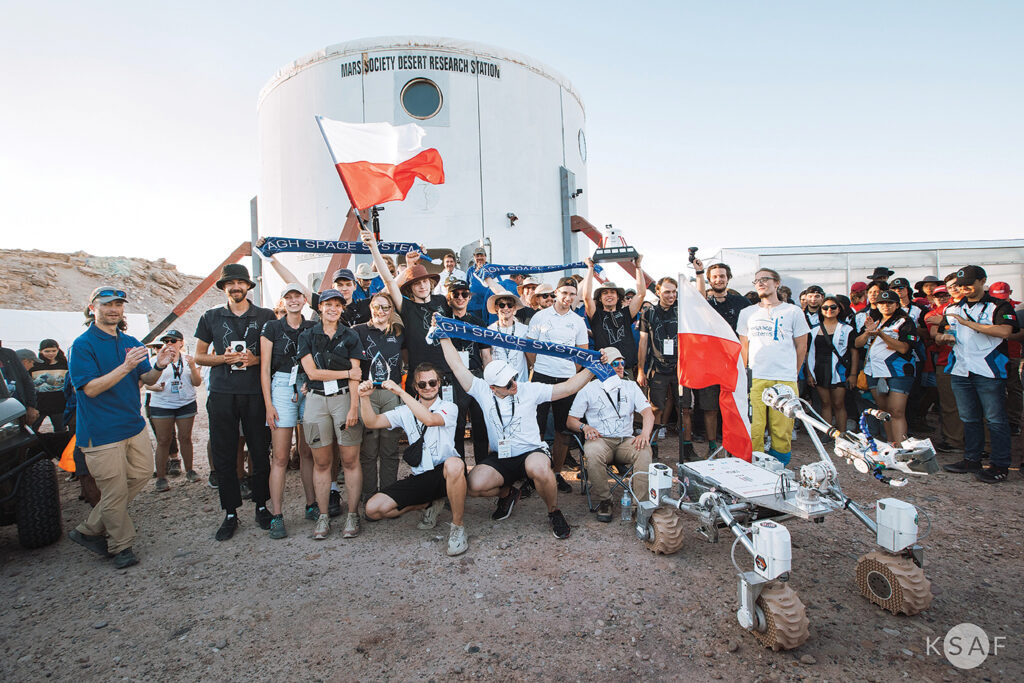
the international University Rover Challenge in the US
Renting or Dorm Living
There’s a large rental market in Poland, and landlords are happy to rent to students. There are also modern dormitories that rival those seen in American college movies.
According to the CBRE report “More Than a Bed – The Professionalization of Poland’s Private Student Dorm Market”, in 2024, eight major academic cities (Warsaw, Kraków, Wrocław, the Tricity area: Gdańsk-Gdynia-Sopot, Poznań, Łódź, Lublin, and Katowice) had 61 private dorms offering 15,430 spots. University-run dorms offer about the same number.
If you’re looking for peace and quiet, you can opt for dormitories managed by church organizations, which have slightly stricter rules.
The average annual cost of housing and meals at a US college campus is around $20,000. In Poland, a year in a high-standard dorm costs about 30,000 PLN—roughly one-fourth the cost. Food is also cheaper—and just as tasty (many say Polish bread is the best in the world!). Plus, Polish students have inherited
a uniquely playful spirit—living in dorms often means unforgettable memories and legendary student parties.
Many students choose to rent apartments or houses together, sharing kitchens and bathrooms. Groups of friends often go for this option. Shared student living is so iconic in Poland that it’s practically legendary. Older generations fondly recall their time in student flats—and unless the partying gets out of hand, local neighbors are often very tolerant of student antics.
All of this makes Poland a top choice for high-quality education at a reasonable price.
Don’t Speak Polish? Don’t Worry!
Not long ago, studying in Poland meant completing an intensive Polish language course. “Polish language – hard language,” Poles joke (deliberately using the wrong grammar to prove the point). But those days are gone. Today, many Polish universities offer full study programs and individual courses in English, especially at the bachelor’s and master’s levels.
Young Poles are fluent in English, so you won’t have trouble with everyday communication—in stores, restaurants, on the street, or while traveling. And even if you do run into someone who doesn’t speak English, don’t worry—Poles are friendly and helpful, and someone will always step in to assist you.
Opinions
Don’t believe it? The internet is full of videos by travelers who came to Poland and students who are studying here. According to global rankings, Poland has been named the safest country in the world for solo female travelers! What impresses travelers and students in Poland the most is the safety—city centers in Poland are full of life at night, and you can walk around in the evenings without any worries. Others praise Polish cuisine—Polish pierogi were even sent into space recently and became a hit on the International Space Station. Some are drawn to the vibrant cultural life: festivals, concerts, a rich selection of theaters, museum exhibitions, and more. Others recommend Polish beer and other local drinks. Almost everyone mentions the hospitality, kindness, and patience of Poles toward visitors. Listen to what students from all over the world have to say and see what they liked most about Poland.
Why else?
Poland is a country full of beautiful places and unique landmarks. Its history spans over 1,000 years. Many sites in Poland are listed as UNESCO World Heritage Sites. There’s something interesting to see in almost every region of the country: Kraków, Wieliczka, Warsaw—almost completely destroyed by the Germans during World War II and rebuilt from the ruins—Łódź, Gdańsk, and many other cities. And beyond the cities, there are mountains, the Kraków-Częstochowa Upland, the Masurian Lake District, and the Baltic Sea. You definitely won’t be bored in Poland. You can try nearly any sport or choose from countless other activities. Every larger city has student clubs, concerts, and festivals where you can have fun and meet amazing people.
Poles are incredibly hospitable. In Poland, there’s a saying: “A guest in the house is God in the house,” and people still live by it. You’ll never leave a Polish home hungry or thirsty. There’s just one rule—Poles expect respect for their country, history, traditions, and culture. If you follow that, you’ll be met with kindness and openness.
Still don’t believe it? Come see for yourself!
Still not convinced? Come to Poland and see it with your own eyes. Almost every university organizes open days where you can explore different fields of study, talk to professors and students, and visit student campuses. Plane tickets to Poland aren’t expensive. You can fly into major Polish cities like Warsaw, Kraków, Poznań, Katowice, or Gdańsk. Start by just exploring. See how beautiful, clean, and safe Poland is. Discover Polish culture, traditions, and food. Learn about Poland’s rich history by visiting Kraków, and uncover the country’s tragic past during World War II at the Warsaw Uprising Museum. Head to the Vistula River and sit with locals on the riverside boulevards—unlike anywhere else in the world. Take a trip to the Bieszczady Mountains—the only mountains in Europe where you can hike for hours without running into crowds. Join a festival and meet young Poles. See for yourself what an incredible country Poland is, and who knows—you may find not just a place to study, but a place to call home. Many people from around the world already have.

